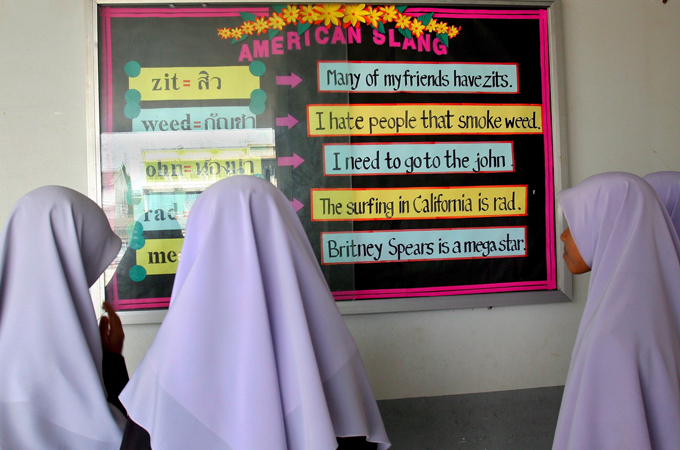Violence endangers Thai schools
New report by rights body blames security forces and separatist fighters for disrupting education in country’s south.

 |
| More than 100 government teachers have been killed in southern Thailand since 2004 [EPA] |
Human Rights Watch (HRW), the New York-based rights group, has warned that unrest in Thailand’s southern provinces was severely endangering the education system.
Schools in southern Thailand have previously been targeted by separatist fighters, who view the system as a symbol of government oppression. Buildings have been burned and teachers attacked.
Keep reading
list of 4 items‘Triple spending’: Zimbabweans bear cost of changing to new ZiG currency
‘We share with rats’: Neglect, empty promises for S African hostel-dwellers
Thirty years waiting for a house: South Africa’s ‘backyard’ dwellers
But a new report from HRW, released on Tuesday, accuses the Thai armed forces of being just as guilty of disrupting education and endangering the lives of schoolchildren, by using schools as military bases.
Schools as barracks
Sunai Phasuk, a senior researcher at HRW, told Al Jazeera that the Thai government needs to eliminate the presence of security forces in schools.
“There will not be an atmosphere of progress towards some sort of peace, if security forces are present in places where only teachers should be,” he said.
HRW also urged the Thai government to ensure the safety of schools after two teachers were killed in Narathiwat province in early September, which sparked the suspension of classes in state-run schools for three days.
In the September 7 attack, an assailant on a motorcycle with an M16 assault rifle shot the teachers as they were travelling on a motorcycle to a morning market in Tanyongmas district.
Their killings took place amid a wave of attacks during the Muslim holy month of Ramadan.
“Insurgent attacks on teachers have created the most serious disruption to education in the south,” Sophie Richardson, the acting Asia director at HRW, said.
“These grave crimes cannot be justified in any circumstances.”
HRW also expressed concern about the unlawful use of force by regular and volunteer members of the Thai security forces and the mistreatment of persons in custody.
Over the past six years, there have been no successful criminal prosecutions in cases of attacks on Muslims – including assassinations of religious teachers and students of Islamic schools.
Some of the attacks were reportedly in revenge for attacks on government officials and the ethnic Thai Buddhist population.
‘Vigilante violence’
HRW reported that the police had dropped criminal charges against an army-trained militiaman attached to a village protection force unit in Narathiwat that is known in the area for using extrajudicial tactics and vigilante violence against alleged separatist fighters.
Suthirak Kongsuwan had also been accused of leading a team of gunmen who attacked Muslim worshippers at Al Furqan Mosque in Jo Airong district in June 2009, killing 10 people and wounding 12 others.
“Insurgents might claim that abuses by the security forces justify their attacks, but the Thai government should not allow its troops to adopt the same logic,” Richardson said.
“Any attempt by the government to shield soldiers from criminal responsibility will further intensify a cycle of reprisal violence.”
According to HRW, separatist fighters have been implicated in 108 deaths and 103 injuries of government teachers since January 2004, when the insurgency escalated.
Other education personnel – from school janitors to school administrators – have also been targeted, and at least 27 have been killed and 19 injured during the same period from gunfire and bombings.
More than 4,000 people have been killed in southern Thailand in six years of fighting between security forces and separatist fighters who are seeking an independent Muslim homeland.